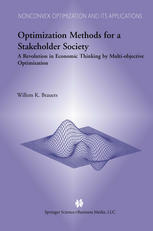

Most ebook files are in PDF format, so you can easily read them using various software such as Foxit Reader or directly on the Google Chrome browser.
Some ebook files are released by publishers in other formats such as .awz, .mobi, .epub, .fb2, etc. You may need to install specific software to read these formats on mobile/PC, such as Calibre.
Please read the tutorial at this link: https://ebookbell.com/faq
We offer FREE conversion to the popular formats you request; however, this may take some time. Therefore, right after payment, please email us, and we will try to provide the service as quickly as possible.
For some exceptional file formats or broken links (if any), please refrain from opening any disputes. Instead, email us first, and we will try to assist within a maximum of 6 hours.
EbookBell Team

5.0
108 reviewsFor both public and private managers, the book Optimization Methods for a Stakeholder Society is today's key to answer the problem of a sustainable development world. This world has to take into account the meaning of all stakeholders involved and has to reconcile a number of objectives, such as economic growth, employment and preservation of the ecosystem. Traditional methods, such as cost-benefit, are outmoded as they translate all these objectives into monetary costs, a materialistic approach. On the contrary, objectives have rather to stick to their own units, eventually indicators.